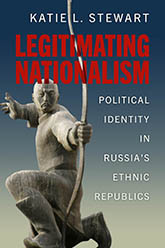|
Legitimating Nationalism
Political Identity in Russia’s Ethnic Republics
Katie L. Stewart
“An outstanding book on a fascinating topic—a major contribution. Impressive, unique fieldwork on Russia’s ethnic minority regions contributes to a discussion of unprecedented depth and richness that enriches our understanding of how Russian nation building actually plays out.”
—Henry E. Hale, author of Patronal Politics: Eurasian Regime Dynamics in Comparative Perspective
Understanding the deployment of nation building in Russia
Russia is a large, diverse, and complicated country whose far-flung regions maintain their own histories and cultures, even as President Vladimir Putin increases his political control. Powerful, autocratic regimes still need to establish their legitimacy; in Russia, as elsewhere, developing a compelling national narrative and building a sense of pride and belonging in a national identity is key to maintaining a united nation. It can also legitimate political power when leaders present themselves as the nation’s champions. Putin’s hold thus requires effective nation building— propagating the ever-evolving and often contested story of who, exactly, is Russian and what, exactly, that means.
Even in the current autocratic system, however, Russia’s multiethnic nature and fractured political history mean that not all political symbols work the same way everywhere; not every story finds the same audience in the same way. The message may emanate from Moscow, but regional actors—including local governments, civic organizations, and cultural institutions—have some agency in how they spread the message: some regionalization of identity work is permitted to ensure that Russian national symbols and narratives resonate with people, and to avoid protest. This book investigates how nation building works on the ground through close studies of three of Russia’s ethnic republics: Karelia, Tatarstan, and Buryatia. Understanding how the project of legitimating nationalism, in support of a unified country and specifically Putin’s regime, works in practice offers crucial context in understanding the shape and story of contemporary Russia.
Katie L. Stewart is an associate professor of political science and international relations at Knox College.
Author's Website - https://klstewart.wordpress.com/
Praise
“Addresses how the Kremlin’s nation-building strategy has been implemented in Russia’s multiethnic locales. The issue of coevolving, identity-building projects at various levels in Russia is potentially crucial for Russia’s future, and this is an original inquiry into the heart of these processes.”
—Gulnaz Sharafutdinova, author of The Red Mirror: Putin’s Leadership and Russia’s Insecure Identity
Table of Contents
List of Illustrations
Preface and Acknowledgments
Note on Translation and Transliteration
Introduction
Part I
1. A Theory of Legitimating Nationalism
2. The Effectiveness of Legitimating Nationalism
Part II
3. Marking the Nation: Capital City Monuments
4. Celebrating the Nation: Holidays in Russia’s Regions
5. Curating the Nation: Regional Museums
6. Teaching the Nation: Regional History Textbooks
Conclusion
Appendixes
Notes
References
Index
|

Larger images
June 2024
LC: 2023043894
312 pp. 6 x 9
15 b/w illus., 26 tables
|

